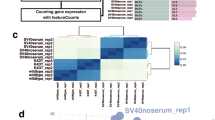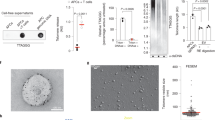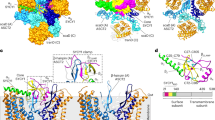Abstract
Transformation with viral oncogene extends the lifespan of normal cells beyond replicative senescence called M1, but most of them eventually succumb to second crisis called M2 when telomeres become critically short. To acquire an infinite growth capacity, these cells have to overcome M2 crisis, which is known to follow telomerase activation. We have investigated if telomerase expression is required for virus-transformed pre-M2 cells to avert M2 crisis. Human retinal pigment epithelial (RPE) cells were transformed with simian virus 40 large T antigen and a VR3 clone in pre-M2 stage was obtained. Then, VR3 cells were transfected with a telomerase-containing vector and two cell lines that expressed telomerase temporarily or continuously were cloned and designated as ST1 and ST2, respectively. Normal RPE cells went into senescence after 36 population doublings. Although the lifespan was extended in the VR3 clone about 20 times more, it eventually underwent second crisis. The telomere length of VR3 decreased compared to that of normal RPE cells and the decrease continued during subculture. However, the ST1 and ST2 clones that expressed both T antigen and telomerase could avert this crisis. The initial telomere length of ST1 and ST2 was longer than that of normal cells. The ST1 underwent growth arrest again as telomerase expression faded out and elongated telomere was shortened, but the ST2 that maintained telomerase activity and telomere length proliferated continuously. In conclusion, telomerase activation is definitely required to overcome M2 crisis and acquire an infinite lifespan in human somatic epithelial cells and this mechanism is independent from M1 crisis escape in cell immortalization.
Similar content being viewed by others
Article PDF
Author information
Authors and Affiliations
Rights and permissions
This is an Open Access article distributed under the terms of the Creative Commons Attribution Non-Commercial License (http://creativecommons.org/licenses/by-nc/3.0/) which permits unrestricted non-commercial use, distribution, and reproduction in any medium, provided the original work is properly cited.
About this article
Cite this article
Park, JK., Kim, BH., Han, Y. et al. The effect of telomerase expression on the escape from M2 crisis in virus-transformed human retinal pigment epithelial cells. Exp Mol Med 34, 107–113 (2002). https://doi.org/10.1038/emm.2002.16
Published:
Issue date:
DOI: https://doi.org/10.1038/emm.2002.16
This article is cited by
-
Mechanisms and significance of therapy-induced and spontaneous senescence of cancer cells
Cellular and Molecular Life Sciences (2020)
-
Photosensitization of A2E triggers telomere dysfunction and accelerates retinal pigment epithelium senescence
Cell Death & Disease (2018)
-
Isolation and characterization of a spontaneously immortalized bovine retinal pigmented epithelial cell line
BMC Cell Biology (2009)



